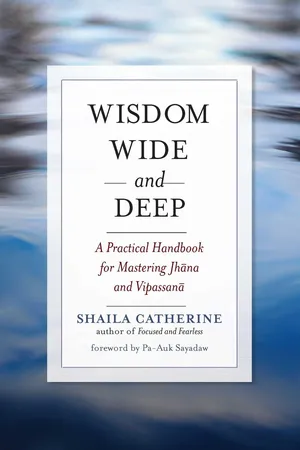
Wisdom Wide and Deep
A Practical Handbook for Mastering Jhana and Vipassana
- 456 pages
- English
- ePUB (mobile friendly)
- Available on iOS & Android
About this book
Wisdom Wide and Deep is a comprehensive guide to an in-depth training that emphasizes the application of concentrated attention ( jhana ) to profound and liberating insight ( vipassana ). With calm, tranquility, and composure established through a practical experience of jhana meditators are able to halt the seemingly endless battle against hindrances, eliminate distraction, and facilitate a penetrative insight into the subtle nature of matter and mind. It was for this reason the Buddha frequently exhorted his students, Wisdom Wide and Deep follows and amplifies the teachings in Shaila Catherine's acclaimed first book, Focused and Fearless: A Meditator's Guide to States of Deep Joy, Calm, and Clarity. Readers will learn to develop this profound stability, sustain an in-depth examination of the nuances of mind and matter, and ultimately unravel deeply conditioned patterns that perpetuate suffering. This fully detailed manual for the mind sure to become a trusted companion to many inner explorers.
Frequently asked questions
- Essential is ideal for learners and professionals who enjoy exploring a wide range of subjects. Access the Essential Library with 800,000+ trusted titles and best-sellers across business, personal growth, and the humanities. Includes unlimited reading time and Standard Read Aloud voice.
- Complete: Perfect for advanced learners and researchers needing full, unrestricted access. Unlock 1.4M+ books across hundreds of subjects, including academic and specialized titles. The Complete Plan also includes advanced features like Premium Read Aloud and Research Assistant.
Please note we cannot support devices running on iOS 13 and Android 7 or earlier. Learn more about using the app.
Information



Table of contents
- Cover
- Title
- Table of Contents
- List of Meditation Instructions
- List of Tables
- Publisher’s Acknowledgment
- Foreword by Pa-Auk Sayadaw
- Acknowledgments
- Introduction: Approaching Deep Calm and Insight
- Section I. Establishing Concentration through Mindfulness with Breathing
- Section II. Concentration Beyond the Breath
- Section III. Discerning Ultimate Realities
- Section IV. Realizing the Deathless Liberation
- Notes
- Bibliography
- Glossary of Pāli Terms and Buddhist Concepts
- Index
- About the Author
- Also Available from Wisdom Publications
- About Wisdom Publications
- Copyright
